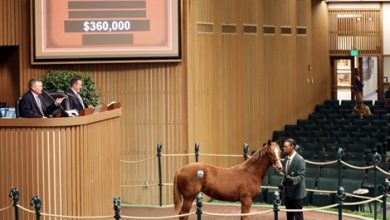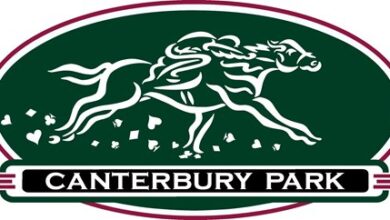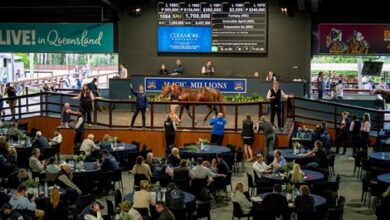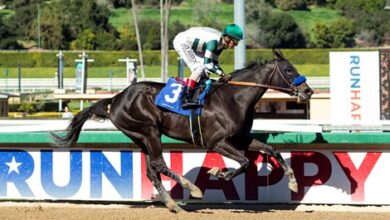On the Rise: Alex Foley
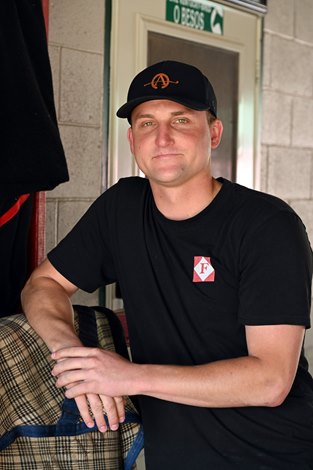
As the newly minted executive director of the Kentucky Horsemen’s Benevolent and Protective Association, Alex Foley knows what is on the minds of his constituents, the trainers, and owners that support the state’s five Thoroughbred racetracks. A son and former assistant to his father, Kentucky-based trainer Greg Foley, Alex is a third-generation horseman.
When the Kentucky HBPA leadership opportunity presented itself last fall, it represented a crossroads for the 32-year-old native of Louisville, Ky.: try something different or stay working alongside his father and brother, Travis, also an assistant in the Foley shedrow.
In a Jan. 15 interview with BloodHorse, Alex discusses his decision. His answers are edited for clarity and space.
BloodHorse: What are your earliest childhood memories of being around your father’s barn?
Alex Foley: Before I started elementary school, 4 or 5 years old, Dad would take me (to the barn) very early in the morning, now and then. I would have my little clipboard and I would go around the barn checking off who was doing their job. I had no clue what I was looking at. After about 20 minutes, I would get tired or cold, and go to the office. Dad would give me a box of powdered donuts and an Orange Sunkist. I had my little bag of toys and I would sit in there and watch TV. I claimed I worked 20 minutes and then I was done for the day.
BH: Who is your favorite horse trained by your father?
AF: My favorite Foley horse of all time is Champali (a multiple graded stakes winner). He ran in the (2004) Breeders’ Cup, made over $1 million. I actually am staring at a picture of him right now, winning the (2004) Phoenix Stakes at Keeneland.
He was my dad’s first real good horse. He gave exposure to our barn, our owners—and they are still lifelong owners with us, Fred Schwartz and Jim Bakke. I got to go to races (with Champali), races that I used to watch on TV, and we were never a part of. The horse kind of put Dad on the map. Champali showed us a different side of the game, so it made it feel like it was within our grasp to be a part of that. Sure enough, we got there… 20 years later. But the flame was already lit (before Champali)—I loved horse racing even when we had $10-20K claimers.
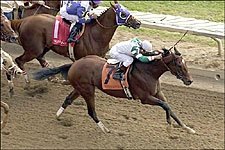
Champali wins the 2004 Phoenix Breeders’ Cup Stakes at Keeneland
BH: You come from a family of hardworking and successful horsemen. What impact has that had on your personal and professional growth?
AF: My grandfather, Dravo, was the first one to start training and passed it down to my father and my Aunt Vickie. I saw how hard they worked every day. It’s a 365, seven-day-a-week job. I gained respect for them doing that. It teaches you how to keep your head down and work hard.
(My dad) wasn’t able to be around all the time. That took a little bit of a toll on us growing up because he had to miss some of our stuff. But he did a good job. In high school, my brother and I were both decent basketball players and instead of going south (in the winter), where my dad could have made a little bit more money, he stayed at Turfway (Park), so he could watch our basketball games, which was pretty cool.
My mother, Sheree, is the rock of this family. Without her, we wouldn’t be where we are today.
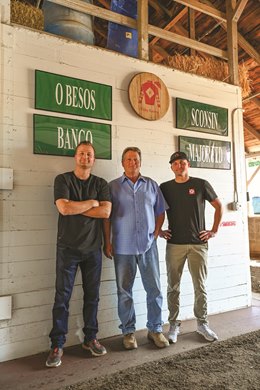
Greg Foley (center) with his sons, Travis (left), and Alex
BH: Growing up, were you encouraged to find your career path through your education rather than it being a given you would become involved with horses?
AF: My family very much wanted me to pursue avenues outside of horse racing. Anyone involved in horse racing knows how hard it is on family and friends, because you’re traveling all the time and you don’t get days off. The security of a normal life is what my father and mother wanted for me.
Dad always joked with me and my older brother, Travis, ‘I put you both through all sorts of schools. You got bachelor’s degrees, PhDs, things like that. You could have saved me a lot of money just by going straight to the racetrack.’ We love the racetrack; we just couldn’t stay away from it.
BH: You completed your law degree; did you ever practice?
AF: I graduated in 2018, but I didn’t practice. I sat for the bar that September. I passed the essay portion, and then failed the (multiple-choice examination) the first time. They used to have a rule—it’s a two-day test, first day is the essay and the second day is the multiple choice—whatever portion you passed, you only would have to take the portion you failed the next time. So, I had to study again for the multiple-choice test, which was the following February, and then I failed it for the second time, by one question. I was going to take it again, but then they changed the rule that you had to take both portions again, so that’s when I went to work on the racetrack. Everybody told me to go and take it again, but I don’t think I ever wanted to practice. I love the law, and actually I loved both of my clerkships—I worked at the office of the Commonwealth’s County Attorneys. My boss had always joked, ‘Who cares if you can’t pass that portion of the test, just keep taking it until you do, because you’re going to be a great lawyer. Seems you just can’t stay away from the racetrack. (But) if you want to go to the racetrack, just don’t worry about it, and go.’ He’s still a good buddy of mine and we still joke about that.
BH: What motivated you to apply for the executive director position at the Kentucky HBPA?
AF: I did not apply initially. At first, I had a couple of reservations, simply because I was my dad’s traveling assistant. Our barn is doing so well right now, and everything was clicking so smoothly. I love working for my dad and brother. A couple members on the board and Rick Hiles (president of the Kentucky HBPA) called me and said, ‘You really should think about taking this job.’ My dad said, ‘I respect the fact that you love working for me, but you seriously need to think about taking this job. It provides you a little more security and stability in terms of not having to move around all the time. You can raise a family and stay here in Louisville, year-round.’ That was the main reason—when my father gave me his blessing. It’s the best decision I made and I couldn’t be happier.
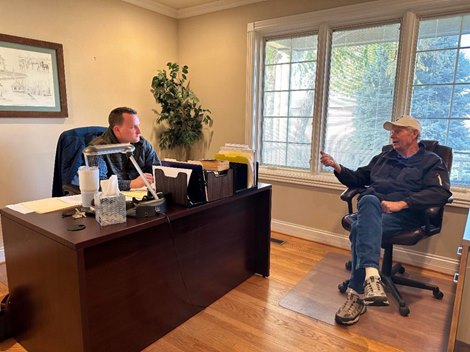
Foley and Kentucky HBPA president Rick Hiles
BH: How is the transition going for you?
AF: I’ll tell you what, the alarm clock is a lot easier on me. My schedule is a whole lot easier on my body. Transition has been great. I work directly with Rick every day and he’s been involved with the HBPA for many years. He knows everything, the ins and outs and the politics of it. He goes everywhere with me; he couldn’t be a better mentor. I’m very fortunate I have Rick with me and our board. My executive assistant, Sara Toomey, has been with the HBPA for over 15 years, and I rely heavily on her on a daily basis—she’s a rock star and I’m very grateful for her.
I tell everyone, all the time, especially people outside of horse racing, learning the ins and outs of it and the politics, everything we have our hand in, it’s actually incredible. I knew what the HBPA was my whole life, but I didn’t have a (complete) understanding or appreciation for what they do. Just in a couple months, I now do.
BH: What are your main duties and how do you go about executing them?
AF: I represent the horsemen and all the owners in Kentucky. I represent my horsemen by putting out any fires, like backside maintenance, making sure cleanliness (is being adhered to) on the backside, and addressing racetrack safety. Those are the day-to-day matters. I have meetings with all of our committees as well as the (Kentucky Thoroughbred Association) and the (Kentucky Horse Racing Commission).
Our big things we deal with are the contracts with the five Kentucky racetracks. That’s not every year. Although not daily, it is our most important priority. My predecessor, Marty Maline, retired at a time when our contracts were set for the foreseeable future. The health of the HBPA, and Kentucky racing all around, you couldn’t get any better than the state we are in right now. They put me in a position to succeed. It would be nice to just maintain where we are, but, obviously, there is always room for improvement, and that’s what we are looking to do.
BH: As you look ahead to the coming months, what issues will you be advocating for on behalf of Kentucky horsemen?
AF: My number one priority now is the health and safety of our equine athletes. As you know, that has been an issue. That is at the forefront of what we’re looking at. We’re working with the KTA and HISA (Horseracing Integrity and Safety Authority) as well. Whether you’re pro- or anti-HISA, they are the governing body at the moment, so we’ve got to work with them. Besides the health and safety of our horses, our purses—it’s hard to get any better than they are now—are always a priority.
We have a couple of initiatives to implement in 2024 for our Kentucky horsemen. I can’t really say much more than that at the moment.

